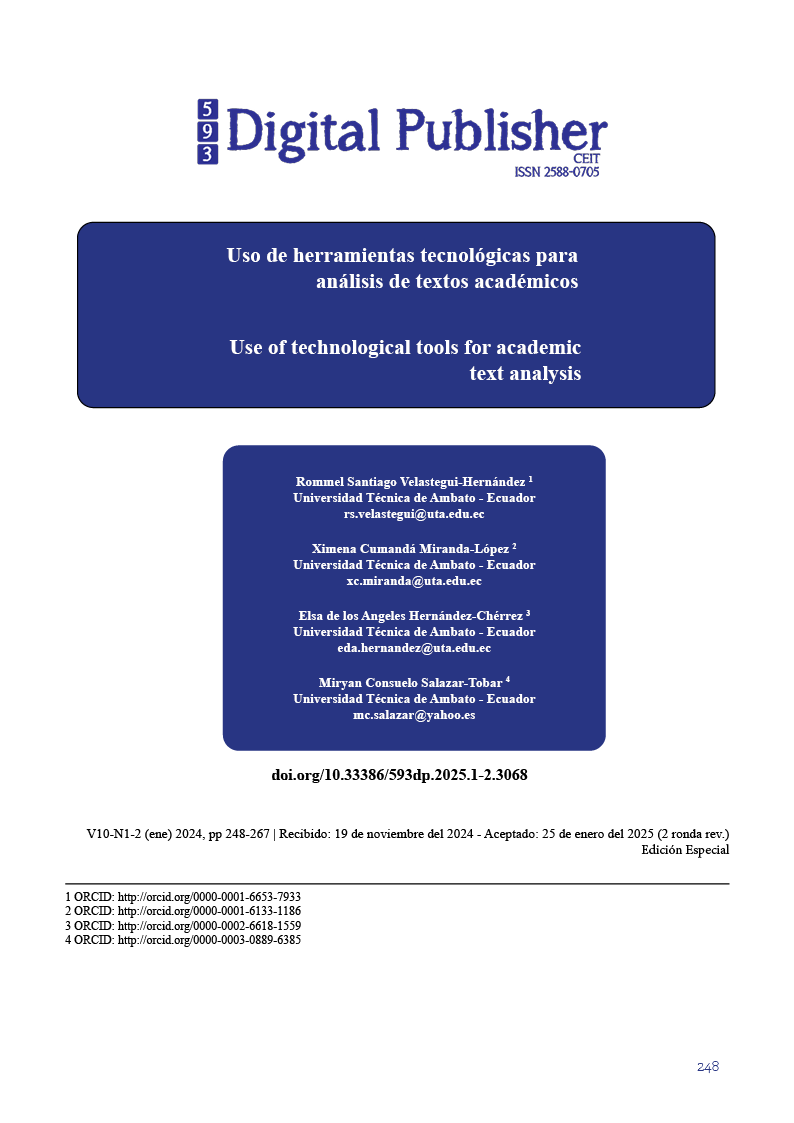Use of technological tools for academic text analysis
Main Article Content
Abstract
Analysis of the academic literature using technological tools has enabled the identification of patterns and emerging themes, facilitating a deeper understanding of current research trends. The use of techniques such as term frequency analysis (TF-IDF) and topic modelling (LDA) has been shown to be effective in extracting key patterns, revealing dominant areas of research and emerging areas before they become widely recognised trends. Through topic modelling, complex relationships between concepts were identified and a more nuanced view of the dynamics of the literature was achieved. In addition, the analysis of co-authorship and citation networks has provided a broader understanding of the relationships between authors and how ideas are disseminated in the scientific community. Interdisciplinarity is a prominent feature in emerging topics, as many of them involve multidisciplinary research areas, such as digital health and green technologies. However, despite the advantages of technological tools, human intervention is required to properly interpret the results, as algorithms may not capture the full context of the topics. In conclusion, these tools improve the efficiency of academic analysis, but must be combined with expert interpretation to ensure accuracy and relevance.
Downloads
Article Details

This work is licensed under a Creative Commons Attribution-NonCommercial-ShareAlike 4.0 International License.
1. Derechos de autor
Las obras que se publican en 593 Digital Publisher CEIT están sujetas a los siguientes términos:
1.1. 593 Digital Publisher CEIT, conserva los derechos patrimoniales (copyright) de las obras publicadas, favorece y permite la reutilización de las mismas bajo la licencia Licencia Creative Commons 4.0 de Reconocimiento-NoComercial-CompartirIgual 4.0, por lo cual se pueden copiar, usar, difundir, transmitir y exponer públicamente, siempre que:
1.1.a. Se cite la autoría y fuente original de su publicación (revista, editorial, URL).
1.1.b. No se usen para fines comerciales u onerosos.
1.1.c. Se mencione la existencia y especificaciones de esta licencia de uso.
References
Ajibade, P., & Muchaonyerwa, N. (2023). The importance of data mining, user information behaviour and interaction audit for information literacy. Library Hi Tech News, 40(4), 12–14. https://doi.org/10.1108/LHTN-09-2022-0109
Alharbi, M. A., & Alqefari, A. N. (2021). The impact of teacher feedback via Google Doc in L2 learners’ writing. International Journal of Learning, Teaching and Educational Research, 20(11), 170–194. https://doi.org/10.26803/ijlter.20.11.10
Archibald, M., Wiebe, S., Rieger, K., Linton, J., & Woodgate, R. (2021). Protocol for a systematic review of living labs in healthcare. BMJ Open, 11(2), 039246. https://doi.org/10.1136/bmjopen-2020-039246
Ayeni, P. O., Agbaje, B. O., & Tippler, M. (2021). A Systematic Review Of Library Services Provision In Response To Covid-19 Pandemic. Evidence Based Library and Information Practice, 16(3), 67–104. https://doi.org/10.18438/eblip29902
Barhoumi, C. (2017). Analysis of technological, individual and community factors influencing the use of popular Web 2.0 tools in LIS education. Electronic Library, 35(5), 977–993. https://doi.org/10.1108/EL-03-2016-0069
Baskici, C., Atan, S., & Ercil, Y. (2019). Forecasting of innovation in the light of semantic networks. Procedia Computer Science, 158, 443–449. https://doi.org/10.1016/j.procs.2019.09.074
Bazarov, B. V., Rinchinov, O. S., & Bazarov, A. A. (2022). Digital Transformation of Written Heritage of Tibetan Buddhism: State of the Art and Prospects[Цифровая трансформация письменного наследия тибетского буддизма: состояние и перспективы]. Volume 15, Issue 4, Pages 740 - 750, 15(4), 740–750. https://doi.org/10.22162/2619-0990-2022-62-4-740-750
Bernsteiner, A., Haagen-Schützenhöfer, C., & Schubatzky, T. (2025). Teacher Education in the Age of Digitality: Conclusions From a Design-Based Research Project. European Journal of Education, 60(1), e12904. https://doi.org/10.1111/ejed.12904
Cantamessa, M., & Montagna, F. (2023). Management of innovation and product development: Integrating business and technological perspectives. In Management of Innovation and Product Development: Integrating Business and Technological Perspectives. Springer London. https://doi.org/10.1007/978-1-4471-7531-5
Costa, V. S. L. P., Stéfani, G. M., Ferenhof, H. A., Lima, F. S., & Cola, M. (2021). Children’s health care in mass-casualty incidents: A systematic literature review. Prehospital and Disaster Medicine, 36(6), 739–746. https://doi.org/10.1017/S1049023X21001060
Dergaa, I., Chamari, K., Zmijewski, P., & Saad, H. Ben. (2023). From human writing to artificial intelligence generated text: examining the prospects and potential threats of ChatGPT in academic writing. Biology of Sport, 40(2), 615–622. https://doi.org/10.5114/BIOLSPORT.2023.125623
Durmuşoǧlu, A. (2016). A pre-assessment of past research on the topic of environmental-friendly electronics. Journal of Cleaner Production, 129, 305–314. https://doi.org/10.1016/j.jclepro.2016.04.068
Egerod, I., Kaldan, G., Albarran, J., Coombs, M., Mitchell, M., & Latour, J. M. (2019). Elements of intensive care bereavement follow-up services: A European survey. Nursing in Critical Care, 24(4), 201–208. https://doi.org/10.1111/nicc.12459
Fadilla, R. Z., Seleng, R. R., Putra, A. Z., Hamzah Hutapea, H., Putra Eben, J. H., & Rakhmawati, N. A. (2023). Bibliometric Analysis of Financial Management Applications on Student’s Financial Awareness and Condition. 2023 International Conference on Advanced Mechatronics, Intelligent Manufacture and Industrial Automation, ICAMIMIA 2023 - Proceedings, 479–484. https://doi.org/10.1109/ICAMIMIA60881.2023.10427628
García-Flores, V., & Martos, L. P. (2019). Social innovation: Key factors for its development in the territories[Innovación social: Factores claves para su desarrollo en los territorios]. CIRIEC-Espana Revista de Economia Publica, Social y Cooperativa, 97, 245–278. https://doi.org/10.7203/CIRIEC-E.97.14148
Gu, W., Shu, L., Chen, W., Wang, J., Wu, D., Ai, Z., & Li, J. (2023). Evaluation of Chinese healthcare organizations’ innovative performance in the digital health era. Frontiers in Public Health, 11, 1141757. https://doi.org/10.3389/fpubh.2023.1141757
Hammond, K. M., Lucas, P., Hassouna, A., & Brown, S. (2023). A Wolf in Sheep’s Clothing? Critical Discourse Analysis of Five Online Automated Paraphrasing Sites. Journal of University Teaching and Learning Practice, 20(7), 08. https://doi.org/10.53761/1.20.7.08
Khakimova, E. M. (2023). Russian-language podcasts as modern discursive practice and research subject[Русскоязычные иодкасты как современная дискурсивная практика и предмет исследования]. Vestnik Tomskogo Gosudarstvennogo Universiteta, Filologiya, 84, 72–95. https://doi.org/10.17223/19986645/84/4
Mahyoob, M., Algaraady, J., & Alblwi, A. (2023). A Proposed Framework for Human-like Language Processing of ChatGPT in Academic Writing. International Journal of Emerging Technologies in Learning, 18(14), 282–293. https://doi.org/10.3991/ijet.v18i14.41725
Martínez-López, J. I., Barrón-González, S., & López, A. M. (2019). Which are the tools available for scholars? A review of assisting software for authors during peer reviewing process. Publications, 7(3), 59. https://doi.org/10.3390/publications7030059
Miao, J., Thongprayoon, C., Suppadungsuk, S., Garcia Valencia, O. A., Qureshi, F., & Cheungpasitporn, W. (2024). Ethical Dilemmas in Using AI for Academic Writing and an Example Framework for Peer Review in Nephrology Academia: A Narrative Review. Clinics and Practice, 14(1), 89–105. https://doi.org/10.3390/clinpract14010008
Modlo, Y. O., Semerikov, S. O., Bondarevskyi, S. L., Tolmachev, S. T., Markova, O. M., & Nechypurenko, P. P. (2020). Methods of using mobile Internet devices in the formation of the general scientific component of bachelor in electromechanics competency in modeling of technical objects. CEUR Workshop Proceedings, 2547, 217–240.
Mohammed, A. T., Velander, J., & Milrad, M. (2024). A Retrospective Analysis of Artificial Intelligence in Education (AIEd) Studies: Perspectives, Learning Theories, Challenges, and Emerging Opportunities. In Lecture Notes in Educational Technology: Vol. Part (pp. 127–141). Springer Science and Business Media Deutschland GmbH. https://doi.org/10.1007/978-981-97-8638-1_9
Noor, M. F., Kumar, A., Tripathi, S., & Gupta, V. (2024). Challenges in Adopting Industry 4.0 for Indian Automobile Industries: A Key Experts’ Perspective. Volume 57, Issue 1, Pages 239 - 253, 57(1), 239–253. https://doi.org/10.18280/jesa.570123
Ortiz, J. C. G., & Trachana, A. (2022). Architecture and social transformation. The emerging discourses in the training of architects in Latin American schools[Arquitectura i transformació social. Els discursos emergents en la formació d’arquitectes a les escoles llatinoamericanes][Arquitectura y transformación social Los discursos emergentes en la formación de arquitectos en las escuelas latinoamericanas]. On the W@terfront, 64(4), 3–70. https://doi.org/10.1344/waterfront2022.64.4.01
Puccetti, G., Giordano, V., Spada, I., Chiarello, F., & Fantoni, G. (2023). Technology identification from patent texts: A novel named entity recognition method. Technological Forecasting and Social Change, 186, 122160. https://doi.org/10.1016/j.techfore.2022.122160
Qian, L., Zhang, Z., Wu, D., Chang, Z., Yu, Q., Hu, M., & Liu, Y. (2024). The Large Language Model for Scientific Literature: Method, Framework, and Application. Journal of Library Science in China, 50(6), 45–58. https://doi.org/10.13530/j.cnki.jlis.2024046
Quinn, M. (2022). Who’s reading who? Surveying languages of research in Timor-Leste[Quem está a ler quem? Levantamento das línguas de pesquisa em Timor- Leste][Sé mak lee sé nia peskiza? Survei kona-ba língua peskiza iha Timor-Leste]. Journal of English for Research Publication Purposes, 3(2), 198–224. https://doi.org/10.1075/jerpp.21019.qui
Rashidov, A. (n.d.). Algorithm for generating an abstract of a scientific publication with the assistance of ChatGPT. 2024 15th International Conference on Computing Communication and Networking Technologies, ICCCNT 2024, Kamand. https://doi.org/10.1109/ICCCNT61001.2024.10724617
Rathi, D., & Given, L. M. (2017). Non-profit organizations’ use of tools and technologies for knowledge management: a comparative study. Journal of Knowledge Management, 21(4), 718–740. https://doi.org/10.1108/JKM-06-2016-0229
Sánchez-Bolívar, L., Escalante-González, S., & Martínez-Martínez, A. (2024). The Ethics of Artificial Intelligence in Education: Threat or Opportunity? [A ética da inteligência artificial na educação: Ameaça ou oportunidade?][La ética de la inteligencia artificial en educación: ¿Amenaza u oportunidad?]. Revista Electronica Educare, 28. https://doi.org/10.15359/ree.28-S.20541
Santiago, C. S., Embang, S. I., Acanto, R. B., Ambojia, K. W. P., Aperocho, M. D. B., Balilo, B. B., Cahapin, E. L., Conlu, M. T. N., Lausa, S. M., Laput, E. Y., Malabag, B. A., Paderes, J. J., & Romasanta, J. K. N. (2023). Utilization of Writing Assistance Tools in Research in Selected Higher Learning Institutions in the Philippines: A Text Mining Analysis. International Journal of Learning, Teaching and Educational Research, 20(11), 259–284. https://doi.org/10.26803/ijlter.22.11.14
Singaram, V. S., Bagwandeen, C. I., Abraham, R. M., Baboolal, S., & Sofika, D. N. A. (2022). Use of digital technology to give and receive feedback in clinical training: a scoping review protocol. Systematic Reviews, 11(1), 268. https://doi.org/10.1186/s13643-022-02151-8
Solano Hilario, C., Belinda Ccope Jaucha, K., La Rosa de Benavides, L. M. A., & Paul Medina Perez, G. (n.d.). Generative Artificial Intelligence and its impact on the educational quality of students: Systematic Review [La Inteligencia Artificial Generativa y su impacto en la calidad educativa de los estudiantes: Revisión Sistemática]. Proceedings of the LACCEI International Multi-Conference for Engineering, Education and Technology, Jose. https://doi.org/10.18687/LACCEI2024.1.1.1481
Srivastava, M., & Jain, K. (2024). Tracing Evolution of Management of Technology Discipline. IEEE Transactions on Engineering Management, 71, 6526–6539. https://doi.org/10.1109/TEM.2023.3260861
Strobl, C., Ailhaud, E., Benetos, K., Devitt, A., Kruse, O., Proske, A., & Rapp, C. (2019). Digital support for academic writing: A review of technologies and pedagogies. Computers and Education, 131, 33–48. https://doi.org/10.1016/j.compedu.2018.12.005
Vinayavekhin, S., Phaal, R., Thanamaitreejit, T., & Asatani, K. (2023). Emerging trends in roadmapping research: A bibliometric literature review. Technology Analysis and Strategic Management, 35(5), 558–572. https://doi.org/10.1080/09537325.2021.1979210
Weinberger, M., & Bouhnik, D. (2022). Using Textual Analysis Tools to Identify Trends in Privacy Concern Research. Proceedings of the Association for Information Science and Technology, 59(1), 830–832. https://doi.org/10.1002/pra2.741
Weinberger, M., & Bouhnik, D. (2023). Identifying trends in information security and privacy concern research. IFLA Journal, 49(3), 527–540. https://doi.org/10.1177/03400352231172805
Zhao, Y., Li, J., & Liu, K. (2023). The sustainable development of mathematics subject: An empirical analysis based on the academic attention and literature research. Heliyon, 9(8), e18750. https://doi.org/10.1016/j.heliyon.2023.e18750





